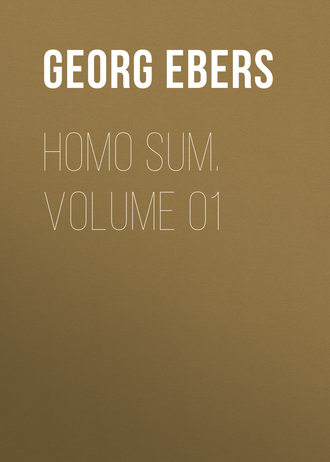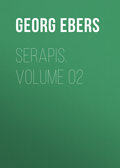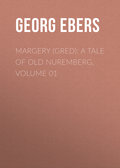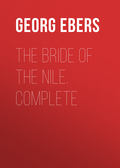
Georg Ebers
Homo Sum. Volume 01
"None can see us but the Most High," answered Paulus, "and for him we cleanse and beautify our souls."
"But the Lord gave us our body too," interrupted Hermas. "It is written that man is the image of God. And we! I appeared to myself as repulsive as a hideous ape when at the great baths by the Gate of the Sun I saw the youths and men with beautifully arranged and scented hair and smooth limbs that shone with cleanliness and purification. And as they went past, and I looked at my mangy sheepfell, and thought of my wild mane and my arms and feet, which are no worse formed or weaker than theirs were, I turned hot and cold, and I felt as if some bitter drink were choking me. I should have liked to howl out with shame and envy and vexation. I will not be like a monster!"
Hermas ground his teeth as he spoke the last words, and Paulus looked uneasily at him as he went on: "My body is God's as much as my soul is, and what is allowed to the Christians in the city—"
"That we nevertheless may not do," Paulus interrupted gravely. "He who has once devoted himself to Heaven must detach himself wholly from the charm of life, and break one tie after another that binds him to the dust. I too once upon a time have anointed this body, and smoothed this rough hair, and rejoiced sincerely over my mirror; but I say to you, Hermas—and, by my dear Saviour, I say it only because I feel it, deep in my heart I feel it—to pray is better than to bathe, and I, a poor wretch, have been favored with hours in which my spirit has struggled free, and has been permitted to share as an honored guest in the festal joys of Heaven!"
While he spoke, his wide open eyes had turned towards Heaven and had acquired a wondrous brightness. For a short time the two stood opposite each other silent and motionless; at last the anchorite pushed the hair from off his brow, which was now for the first time visible. It was well-formed, though somewhat narrow, and its clear fairness formed a sharp contrast to his sunburnt face.
"Boy," he said with a deep breath, "you know not what joys you would sacrifice for the sake of worthless things. Long ere the Lord, calls the pious man to Heaven, the pious has brought Heaven down to earth in himself."
Hermas well understood what the anchorite meant, for his father often for hours at a time gazed up into Heaven in prayer, neither seeing nor hearing what was going on around him, and was wont to relate to his son, when he awoke from his ecstatic vision, that he had seen the Lord or heard the angel-choir.
He himself had never succeeded in bringing himself into such a state, although Stephanus had often compelled him to remain on his knees praying with him for many interminable hours. It often happened that the old man's feeble flame of life had threatened to become altogether extinct after these deeply soul-stirring exercises, and Hermas would gladly have forbidden him giving himself up to such hurtful emotions, for he loved his father; but they were looked upon as special manifestations of grace, and how should a son dare to express his aversion to such peculiarly sacred acts? But to Paulus and in his present mood he found courage to speak out.
"I have sure hope of Paradise," he said, "but it will be first opened to us after death. The Christian should be patient; why can you not wait for Heaven till the Saviour calls you, instead of desiring to enjoy its pleasures here on earth? This first and that after! Why Should God have bestowed on us the gifts of the flesh if not that we may use them? Beauty and strength are not empty trifles, and none but a fool gives noble gifts to another, only in order to throw them away."
Paulus gazed in astonishment at the youth, who up to this moment had always unresistingly obeyed his father and him, and he shook his head as he answered,
"So think the children of this world who stand far from the Most High. In the image of God are we made no doubt, but what child would kiss the image of his father, when the father offers him his own living lips?"
Paulus had meant to say 'mother' instead of 'father,' but he remembered in time that Hermas had early lost the happiness of caressing a mother, and he had hastily amended the phrase. He was one of those to whom it is so painful to hurt another, that they never touch a wounded soul unless to heal it, divining the seat of even the most hidden pain.
He was accustomed to speak but little, but now he went on eagerly:
"By so much as God is far above our miserable selves, by so much is the contemplation of Him worthier of the Christian than that of his own person. Oh! who is indeed so happy as to have wholly lost that self and to be perfectly absorbed in God! But it pursues us, and when the soul fondly thinks itself already blended in union with the Most High it cries out 'Here am I!' and drags our nobler part down again into the dust. It is bad enough that we must hinder the flight of the soul, and are forced to nourish and strengthen the perishable part of our being with bread and water and slothful sleep to the injury of the immortal part, however much we may fast and watch. And shall we indulge the flesh, to the detriment of the spirit, by granting it any of its demands that can easily be denied? Only he who despises and sacrifices his wretched self can, when he has lost his baser self by the Redeemer's grace, find himself again in God."
Hermas had listened patiently to the anchorite, but he now shook his head, and said: "I cannot under stand either you or my father. So long as I walk on this earth, I am I and no other. After death, no doubt, but not till then, will a new and eternal life begin"
"Not so," cried Paulus hastily, interrupting him. "That other and higher life of which you speak, does not begin only after death for him who while still living does not cease from dying, from mortifying the flesh, and from subduing its lusts, from casting from him the world and his baser self, and from seeking the Lord. It has been vouchsafed to many even in the midst of life to be born again to a higher existence. Look at me, the basest of the base. I am not two but one, and yet am I in the sight of the Lord as certainly another man than I was before grace found me, as this young shoot, which has grown from the roots of an overthrown palmtree is another tree than the rotten trunk. I was a heathen and enjoyed every pleasure of the earth to the utmost; then I became a Christian; the grace of the Lord fell upon me, and I was born again, and became a child again; but this time—the Redeemer be praised!—the child of the Lord. In the midst of life I died, I rose again, I found the joys of Heaven. I had been Menander, and like unto Saul, I became Paulus. All that Menander loved—baths, feasts, theatres, horses and chariots, games in the arena, anointed limbs, roses and garlands, purple-garments, wine and the love of women—lie behind me like some foul bog out of which a traveller has struggled with difficulty. Not a vein of the old man survives in the new, and a new life has begun for me, mid-way to the grave; nor for me only, but for all pious men. For you too the hour will sound, in which you will die to—"
"If only I, like you, had been a Menander," cried Hermas, sharply interrupting the speaker: "How is it possible to cast away that which I never possessed? In order to die one first must live. This wretched life seems to me contemptible, and I am weary of running after you like a calf after a cow. I am free-born, and of noble race, my father himself has told me so, and I am certainly no feebler in body than the citizens' sons in the town with whom I went from the baths to the wrestling- school."
"Did you go to the Palaestra?" asked Paulus in surprise.
"To the wrestling-school of Timagetus," cried Hermas, coloring. "From outside the gate I watched the games of the youths as they wrestled, and threw heavy disks at a mark. My eyes almost sprang out of my head at the sight, and I could have cried out aloud with envy and vexation, at having to stand there in my ragged sheep-skin excluded from all competition. If Pachomius had not just then come up, by the Lord I must have sprung into the arena, and have challenged the strongest of them all to wrestle with me, and I could have thrown the disk much farther than the scented puppy who won the victory and was crowned."
"You may thank, Pachomius," said Paulus laughing, "for having hindered you, for you would have earned nothing in the arena but mockery and disgrace. You are strong enough, certainly, but the art of the discobolus must be learned like any other. Hercules himself would be beaten at that game without practice, and if he did not know the right way to handle the disk."
"It would not have been the first time I had thrown one," cried the boy. "See, what I can do!" With these words he stooped and raised one of the flat stones, which lay piled up to secure the pathway; extending his arm with all his strength, he flung the granite disk over the precipice away into the abyss.
"There, you see," cried Paulus, who had watched the throw carefully and not without some anxious excitement. "However strong your arm may be, any novice could throw farther than you if only he knew the art of holding the discus. It is not so—not so; it must cut through the air like a knife with its sharp edge. Look how you hold your hand, you throw like a woman! The wrist straight, and now your left foot behind, and your knee bent! see, how clumsy you are! Here, give me the stone. You take the discus so, then you bend your body, and press down your knees like the arc of a bow, so that every sinew in your body helps to speed the shot when you let go. Aye—that is better, but it is not quite right yet. First heave the discus with your arm stretched out, then fix your eye on the mark; now swing it out high behind you—stop! once more! your arm must be more strongly strained before you throw. That might pass, but you ought to be able to hit the palm-tree yonder. Give me your discus, and that stone. There; the unequal corners hinder its flight— now pay attention!" Paulus spoke with growing eagerness, and now he grasped the flat stone, as he might have done many years since when no youth in Alexandria had been his match in throwing the discus.
He bent his knees, stretched out his body, gave play to his wrist, extended his arm to the utmost and hurled the stone into space, while the clenched toes of his right foot deeply dinted the soil.
But it fell to the ground before reaching which Paulus had indicated as the mark.
"Wait!" cried Hermas. "Let me try now to hit the tree."
His stone whistled through the air, but it did not even reach the mound, into which the palm-tree had struck root.
Paulus shook his head disapprovingly, and in his, turn seized a flat stone; and now an eager contest began. At every throw Hermas' stone flew farther, for he copied his teacher's action and grasp with increasing skill, while the older man's arm began to tire. At last Hermas for the second time hit the palm-tree, while Paulus had failed to reach even the mound with his last fling.
The pleasure of the contest took stronger possession of the anchorite; he flung his raiment from him, and seizing another stone he cried out— as though he were standing once more in the wrestling school among his old companions; all shining with their anointment.
"By the silver-bowed Apollo, and the arrow-speeding Artemis, I will hit the palm-tree."
The missile sang through the air, his body sprang back, and he stretched out his left arm to save his tottering balance; there was a crash, the tree quivered under the blow, and Hermas shouted joyfully: "Wonderful! wonderful! that was indeed a throw. The old Menander is not dead! Farewell—to-morrow we will try again."
With these words Hermas quitted the anchorite, and hastened with wide leaps down the hill in the oasis. Paulus started at the words like a sleep-walker who is suddenly wakened by hearing his name called. He looked about him in bewilderment, as if he had to find his way in some strange world. Drops of sweat stood on his brow, and with sudden shame he snatched up his garments that were lying on the ground, and covered his naked limbs.
For some time he stood gazing after Hermas, then he clasped his brow in deep anguish and large tears ran down upon his beard.
"What have I said?" he muttered to himself; "That every vein of the old man in me was extirpated? Fool! vain madman that I am. They named me Paulus, and I am in truth Saul, aye, and worse than Saul!"
With these words he threw himself on his knees, pressing his forehead against the hard rock, and began to pray. He felt as if he had been flung from a height on to spears and lances, as if his heart and soul were bleeding, and while he remained there, dissolved in grief and prayer, accusing and condemning himself, he felt not the burning of the sun as it mounted in the sky, heeded not the flight of time, nor heard the approach of a party of pilgrims, who, under the guidance of bishop Agapitus, were visiting the Holy Places. The palmers saw him at prayer, heard his sobs, and, marvelling at his piety, at a sign from their pastor they knelt down behind him.
When Paulus at last arose, he perceived with surprise and alarm the witnesses of his devotions, and approached Agapitus to kiss his robe. But the bishop said: "Not so; he that is most pious is the greatest among us. My friends, let us bow down before this saintly man!"
The pilgrims obeyed his command. Paulus hid his face in his hands and sobbed out: "Wretch, wretch that I am!"
And the pilgrims lauded his humility, and followed their leader who left the spot.







